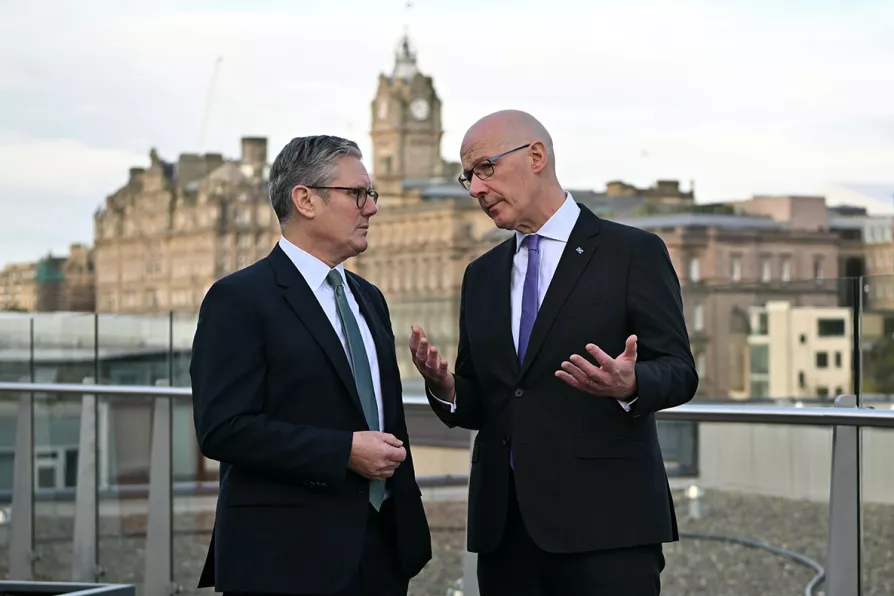If parties are serious about rebuilding trust, as the elections approach, they must embrace bold redistribution, invest in public services and put working people, not the wealthy few, at the heart of Scotland’s future, argues ROZ FOYER

 Prime Minister Sir Keir Starmer speaks with Scotland's First Minister John Swinney during the Council of the Nations and Regions in Edinburgh, the first gathering for metro mayors and first ministers of devolved administrations, October 11, 2024
Prime Minister Sir Keir Starmer speaks with Scotland's First Minister John Swinney during the Council of the Nations and Regions in Edinburgh, the first gathering for metro mayors and first ministers of devolved administrations, October 11, 2024
AT school, I got into a few scrapes.
If you’ve got a temper — and boy did I — trouble is directed your way, and usually with the same person. Things start with some tiny issue, and others notice. They’d form an audience encouraging both of us idiots to lob words at one another.
A nudge to the ribs.
“Are you takin’ that aff him, aye? I wouldnae,” a voice in my ear would say.
Across the way, my opponent was getting the same message; an appeal to the synthetic pride they draped over us that couldn’t be resisted.
Sooner or later, to chants of “fight, fight, fight,” fists would fly before we were carted off by a teacher.
The war ended when our exasperated teacher ditched detention for “community service.” We helped the janitor out, shovelling a bit of coal and cleaning the playground, and found ourselves becoming firm friends, uniting in work and in revulsion at the people who’d goaded us into it all in the first place.
Going about my business the other day, the interweb crashed in to tell me I was being ignored, sidelined, even “snubbed” by the Prime Minister.
On this occasion, though, I shouldn’t take it too personally, but instead feel aggrieved on behalf of the city of Glasgow, nay, the whole ancient nation of Scotland, because someone didn’t get invited to a committee.
Sir Keir held his first nation and regions summit in Edinburgh on Friday. The leaders of devolved administrations across Britain were all there, along with metro mayors representing selected English regions.
But where was Glasgow? Why didn’t the city’s council leader Susan Aitken get an invite? Oh, the humanity!
Aitken invited us all to be sad because she didn’t get to sit with the Prime Minister to talk about a range of subjects the respective officers and civil servants have already agreed on.
There was a bit of push-back on this matter, of course. Some pointed out that Glasgow City Council was not a city region, in fact, it continues to struggle on, unlike almost any other city on Earth, without the tax base of its suburbs.
The appalling suggestion that the solution was the Scottish government creating metro mayors here was even wheeled out — as ever, an answer wandering forlornly in search of a question.
But, we hear in reply, does that mean Scotland is being put on a par with Peterborough at these meetings? I think I’m supposed to be upset by that.
In all candour, I couldn’t care less. It’s just the usual nonsense which has clogged up what passes for politics in Scotland for what seems like an eternity.
If we are invited to be upset by an alleged underrepresentation at a talking shop, then perhaps the First Minister John Swinney, who has more powers at the disposal of his government than any devolved administration in Britain, could ask some friends over — as the host I’m sure it would be hard for such a request to be refused.
For the political classes in Scotland though, such an act would be too radical a gesture. Better by far to wallow in self-pity and the implication the world is out to get us, and all before a drink has even been taken.
After all, what better way to disempower a populace than have leaders whine in perpetuity on their own lack of power?
As the Labour government prepares its first austerity Budget since its last one 15 years ago, the tidal waves of demands for resources from cash-starved services are well under way, and rightly so.
Among them of course, the Scottish government has made its pitch, calling on Rachel Reeves to scrap the disgusting two-child benefits cap, the bedroom tax and ramp up NHS spending to the tune of £16 billion a year. These demands seem reasonable to me, in fact, if anything, they are too reasonable.
If those demands are met, the Scottish government would be released from having to spend cash mitigating slashed benefits and have another £1.6bn in Barnett consequentials to spend on the NHS, the SNP’s Westminster health spokesman Seamus Logan told us this week. I hope he gets his wish, I sincerely do.
What’s not to like?
Well, for a party that has made an art form out of pointing out the apparent bullying and controlling behaviour of “Westminster,” it is to rest an argument for more cash explicitly connecting health spending north and south of the border.

Ben Chacko talks to ALAN MARDGHUM of the Durham Miners Association about Reform UK‘s dangerous inroads into Durham’s long-standing Labour county council; why he cancelled his party membership; and the political class’s disconnect from working people

In his Aw That column MATT KERR looks, with dejection, at the opportunities squandered in the 80 years since Victory in Europe











